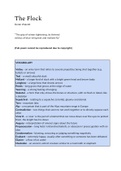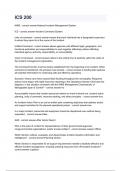The Flock
Derek Walcott
“The grip of winter tightening, its thinned
volleys of blue-wing teal and mallard fly”
(Full poem cannot be reproduced due to copyright)
VOCABULARY
Volley - an army term that refers to several projectiles being shot together (e.g.
bullets or arrows)
Teal - a small colourful duck
Mallard - a larger kind of duck with a bright green head and brown body
Longbow - a large bow that shoots arrows
Reeds - long grass that grows at the edge of water
Yearning - a strong feeling of longing
Skeletal - a form that only shows the bones or structure, with no flesh or detail, like
a skeleton
Sepulchral - relating to a sepulchre (a tomb), gloomy and dismal
Tarn - mountain lake
Alp - a mountain that is part of the Alps mountain range in Europe
Contradiction - two things that seem to not work together or to directly oppose each
other
Vizor’d - a ‘visor’ is the part of a helmet that can move down over the eyes to protect
them, the knight has his down
Augury - interpretation of omens/ signs about the future
Prepossession - long held / entrenched beliefs, or obsession / preoccupation with an
idea
Condemnation - blaming, censuring or judging something negatively
Exultant - extremely happy, usually after something or someone has been defeated
Glacier - a flow of ice water
Mastodon - an ancient, extinct creature similar to a mammoth or elephant
, Tundra - flat, frozen ground that exists across the Arctic
Annihilation - total destruction
Fixity - a permanent state of being
Equinox - the point in the year where days and nights are equal length (in March and
September)
Tropic - several meanings - tropical or relating to the tropics, affecting or influencing
something, or when an organism turns or grows in response to something e.g. plants
grow towards light
STORY/SUMMARY
Stanza 1: As we delve deeper into Winter, birds shoot out of their nests in the reeds
and fly up into the sky, as if they were arrows. They are embarking on a migration to
warmer climates, and will return when the weather is better. They head for the ‘tropic
light’ of the West Indies. At the same time as this migration, the speaker woke up to a
‘violence of images’ in his mind - perhaps remnants of a dream. These are also
‘migrating’ through his mind, from his subconscious to his consciousness. He sees a
‘skeletal forest’ (a forest in winter with bare trees) and a ‘sepulchral knight’ (a gloomy
or dead-looking knight). The knight rides silently at the edge of a black mountain lake,
the horse’s hooves smash into the snow - they look like ants on the blank white space
of the mountain, its ‘forehead’. In their armour, they are heading North, battling against
the same gust of wind that the birds easily ride South on. The knight has his visor
down, so he can barely see, as if he is performing his task with almost blind arrogance
or prejudice - he’s not even aware of the reasons for his quest, his need to fight against
the natural wind when the birds use it to make their lives easier. The speaker, who we
realise is Walcott himself, says he is similar to this knight, the ink from his pen is
comparable to the prints left by the knight in the snow, he tries to find signs and
symbols in winter to document in his writing, and to allow this to be a natural process -
it is as if his subconscious mind is bringing the images to him, rather than him trying to
manipulate or force his thought processes too much.
Stanza 2: The world is eternal and ever-lasting, although its yearly rotation brings
changes in ‘language, climate, customs, light’. We are preoccupied constantly with our
long standing belief in images of flight - this may represent the way in which humans
are obsessed with ideas of progress and change, or escapism from our current
situations. Wallcot reminds us that natural processes of the earth ‘survive’ any brief
human beliefs or judgements, and also the migration of birds - the sun’s exultant larks






